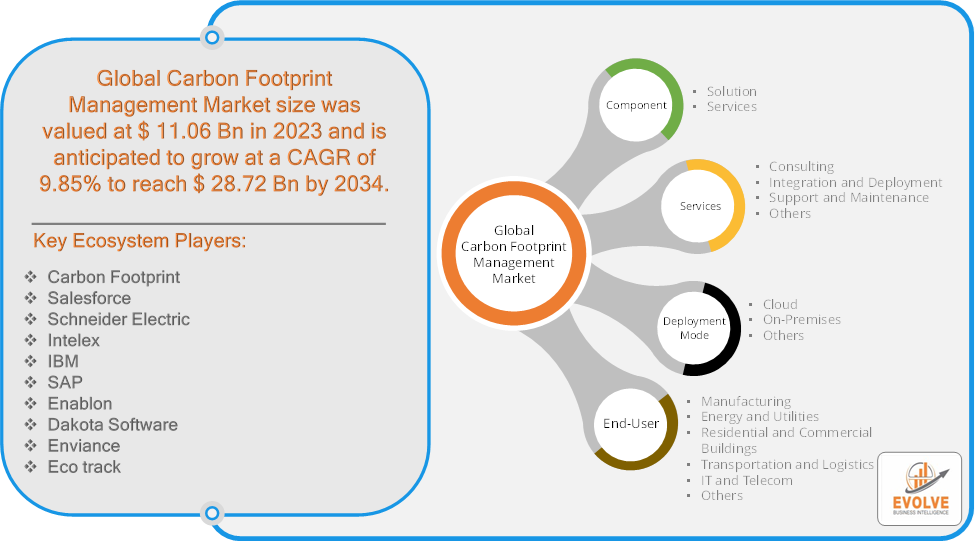Evolve Business Intelligence has published a research report on the Global Carbon Footprint Management Market, 2021–2034. The global Carbon Footprint Management market is projected to exhibit a CAGR of around 4.41%during the forecast period of 2021 to 2034.
Evolve Business Intelligence has recognized the following companies as the key players in the global Carbon Footprint Management Market: Carbon Footprint, Salesforce, Schneider Electric, Intelex, IBM, SAP, Enablon, Dakota Software, Enviance, Eco track
The Carbon Footprint Management Market size accounted for USD 11.06 Billion in 2023 and is estimated to account for 12.85 Billion in 2024. The Market is expected to reach USD 28.72 Billion by 2034 growing at a compound annual growth rate (CAGR) of 9.85% from 2024 to 2034. The market for carbon footprint management is centered on products, techniques, and services that assist businesses in tracking, controlling, and lowering their carbon emissions. Businesses are implementing carbon management strategies in response to the growing worldwide awareness of climate change in order to satisfy sustainability targets, adhere to legal requirements, and reduce their environmental impact. For reporting carbon emissions, the market offers analytics tools, consultancy services, and carbon tracking software. Corporate social responsibility, regulatory pressure, and the desire for greener, cleaner practices are major motivators. Primary users are the energy, manufacturing, and transportation sectors, with demand rising across all industries.
Download the full report now to discover market trends, opportunities, and strategies for success.
Segmental Analysis
The global Carbon Footprint Management market has been segmented based on Component, Services, Deployment Mode, End-User
Based on the Component, the market is segmented based on Solution, Services. Solution segment dominates, as organizations prioritize the implementation of advanced software and tools that facilitate accurate carbon measurement, reporting, and reduction strategies.
Based on Services, the market has been divided into Consulting, Integration and Deployment, Support and Maintenance, Others. Consulting services segment dominates, as organizations increasingly seek expert guidance to develop effective carbon management strategies, comply with regulations, and implement sustainability initiatives
Based on the Deployment Mode, the market has been divided into Cloud, On-Premises, Others. Cloud deployment mode dominates due to its scalability, cost-effectiveness, and ease of access, allowing organizations to efficiently manage their carbon footprint without the need for extensive on-premises infrastructure. The cloud solutions also facilitate real-time data analysis and collaboration across different locations.
Based on End-User, the market has been divided into Manufacturing, Energy and Utilities, Residential and Commercial Buildings, Transportation and Logistics, IT and Telecom, Others. Manufacturing sector dominates due to its substantial emissions and the increasing regulatory pressure to implement sustainable practices. The Energy and Utilities sector also plays a significant role, given its critical impact on carbon emissions and the ongoing transition towards cleaner energy sources.
Regional Analysis
The Carbon Footprint Management market is divided into five regions: North America, Europe, Asia-Pacific, South America, and the Middle East, &Africa. The North American region holds a dominant position in the Carbon Footprint Management market. Due to strict environmental laws and government programs supporting carbon capture and storage technologies, North America has a sizable market share. Europe is not far behind, with an increasing emphasis on targets related to decarbonization and renewable energy. APAC is expected to have robust economic potential as a result of rising urbanization and industrialization, which would increase carbon emissions.Given that rising economies are realizing the necessity for carbon management solutions, South America and MEA are predicted to contribute somewhat to the market as a whole. The Asia-Pacific region is witnessing rapid growth and emerging as a significant market for the Carbon Footprint Management industry. The Asia-Pacific region is experiencing significant growth in the Carbon Footprint Management Market, driven by increasing regulatory pressures, growing awareness of sustainability, and the rising demand for eco-friendly practices among businesses. Countries like China, India, and Japan are leading the charge, implementing policies to reduce carbon emissions and enhance energy efficiency. Additionally, the expansion of manufacturing and energy sectors in this region further fuels the demand for effective carbon management solutions. The focus on achieving net-zero targets is expected to boost market opportunities across various industries in Asia-Pacific.

